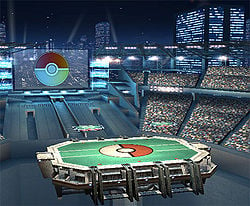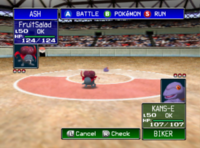Pokémon Stadium 2: Difference between revisions
No edit summary |
No edit summary |
||
| Line 52: | Line 52: | ||
{{clear}} | {{clear}} | ||
==How to Unlock in Super Smash Bros. for Wii U | ==How to Unlock in Super Smash Bros. for Wii U== | ||
Pokémon Stadium 2 can be unlocked in Super Smash Bros. for Wii U by clearing the Solo Event "When Lightning Strikes". | Pokémon Stadium 2 can be unlocked in Super Smash Bros. for Wii U by clearing the Solo Event "When Lightning Strikes". | ||
==Gallery== | ==Gallery== | ||
Revision as of 12:09, November 22, 2014
| Pokémon Stadium 2 | |
|---|---|
 File:PokemonSymbol.png | |
| Universe | Pokémon |
| Appears in | Brawl SSB4 (Wii U) |
| Availability | Brawl: Starter SSB4: Unlockable |
| Unlock criteria | Clear the When Lightning Strikes event (SSBU) |
| Crate type | Futuristic |
| Tracks available | In Brawl: Pokémon Main Theme Road to Viridian City (From Pallet Town/Pewter City) Pokémon Center Pokémon Gym/Evolution Wild Pokémon Battle! (Ruby/Sapphire) In SSB4: Pokémon Main Theme (Pokémon Red / Pokémon Blue) Poké Floats Victory Road (Pokémon Ruby / Pokémon Sapphire) Bolded tracks must be unlocked |
| Article on Bulbapedia | Pokémon Stadium 2 (stage) |
Pokémon Stadium 2 (ポケモンスタジアム2 Pokemonsutajiamu 2) is a stage in Super Smash Bros. Brawl and Super Smash Bros. for Wii U, based on (as its name suggests) the Pokémon universe. The basic layout of the stage is essentially unchanged from Super Smash Bros. Melee's Pokémon Stadium, save for a major graphical upgrade, including a huge space between the crowd and the stadium. The name of this stadium might be a reference to the game Pokémon Stadium 2 for the Nintendo 64. As with the original Pokémon Stadium, every so often, the stage transforms to represent a certain Pokémon type (see "Elements" below). However, unlike its predecessor, Pokémon will occasionally appear in the background.
Tournament legality
Pokémon Stadium 2 is a very controversial stage; it is usually banned in tournaments, although it is allowed as a counterpick in more liberal rulesets. This is because the majority of its transformations are widely considered disruptive to normal gameplay: the electric transformation produces fast conveyor belts that force players to camp the ledge or fight in the middle of the stage; the wind transformation significantly reduces gravity, which slows aerial approaches and results in earlier vertical KOs; and the ice transformation creates slippery terrain which universally decreases traction and slightly increases tripping chance, making more precise movements difficult. Additionally, like PS1, all its transformations except for ice are susceptible to camping.
Some smashers, however, debate PS2's legality, arguing that its perceived disruptive elements are either due to player error or actually beneficial to gameplay. For example, they claim that players can camp out the electric transformation, and that any self-destructs are due to unfamiliarity with the stage rather than a flaw in the stage itself. They also argue that the wind transformation, while actually disruptive, does not last long enough to significantly impact the match. Finally, they suggest that the ice transformation actually enriches gameplay because its terrain boosts the speed and slide distance of DACUSes and slide smashes, and causes shields to be pushed back more, forcing the game to be played more offensively.
Based on these arguments, a few vocal smashers even claim that Pokémon Stadium 2 is actually the most neutral stage in the game. Regardless, it remains banned due to the very specific ways in which players have to adjust to the disruptive nature of transformations.
Elements
There are four possible stage transformations, each of which represents a particular type from the Pokémon games. While this feature was in the Melee version as well, the types represented in Brawl are all new. Whenever the stage transforms, the layout of its platforms changes, and in some cases the very physics of the game becomes altered as well. There is no specific order that these elements appear in - the stage transformation is completely random and it is even possible for the stadium to change into the same type twice in a row. However, the stage always begins on the standard arena and has to revert back to its normal state before transforming again. The elements are as follows:
- Electric: Has two conveyor belts near the edges on the stage, both rotating outward. The two platforms are replaced by three platforms in varying locations, either above the center of the stage, above either conveyor belt, or very high above the center of the stage.
- Flying: Fans in the ground create an updraft that enhances all characters' jumping abilities and delays falling time drastically. Characters flung upward have a much higher chance of being Star KO'ed. The updraft only extends above the platform. Both floating platforms disappear, giving the stage a Final Destination style layout.
- Ground: The layout changes to a large mound of dirt and a hut built into a tall rock. The hut provides two platforms, the lower one being longer and curved, and the higher one being short and flat. No physical effects are added.
- Ice: Makes all platforms and surfaces extremely slippery, so characters are more likely to trip. A hut can be seen in the background, and the two standard platforms are replaced by two icy platforms that slope inwards slightly.
Pokémon
A new feature in Pokémon Stadium 2 is the guest Pokémon who appear in the background of altered stages. They have no effect on the battle itself, but provide a nice addition to the scenery.
- Electric: Electivire and Magnezone
- Flying: Drifloon, Hoppip, and Skarmory.
- Ground: Cubone and Dugtrio, as well as a mysterious fossil.
- Ice: Snorunt and Snover.
Origin
A stage such as this has never been seen in any main series Pokémon game. However, just like Pokémon Stadium, it looks identical to the arenas from the Pokémon Stadium games. The arenas in Pokémon Stadium have the Poké Ball logo in the center with crowds watching the battle, and the various arenas in the game were heavily aesthetically themed (such as the ice type gym being covered in ice), just like the type specific transformations of this stage.
While the other transformations don't seem to have a specific origin, the flying transformation's aesthetics are reminiscent of Valley Windworks from the Sinnoh region. The transformation features wind turbines like those seen in Valley Windworks, and the rare Pokémon Drifloon makes a guest appearance here, where in Diamond/Pearl/Platinum, the Valley Windworks was the only location where a Drifloon could be encountered.
How to Unlock in Super Smash Bros. for Wii U
Pokémon Stadium 2 can be unlocked in Super Smash Bros. for Wii U by clearing the Solo Event "When Lightning Strikes".
Gallery
- UnknownPokemonStadium.png
One of two known images of the stage in Super Smash Bros. for Wii U, alongside this one.
Trivia
- The cabin in the stage's Ice mode features a poster of a kitten within its walls. The identity of the cat is unknown, though it was heavily rumoured to be Masahiro Sakurai's before he eventually stated this was not the case.[1]
- Unlike the Melee Pokémon Stadium, characters fly in front of the screen in the background when Star KO'ed. In the original one, characters fly behind the screen.
- In the original Dojo screenshot of the Flying element of the stage, Drifloon and Hoppip are shown much farther away than in the final version of Brawl.
- When playing as Wario or Wario-Man, using a fully charged Wario Waft on the Flying stage will result in an instant Star KO.
- If the player is looking through Luigi's Negative Zone at the screen behind the stadium, if the screen is showing a place in the Negative Zone as well, due to the double negative, the player will be able to see the true colors there.
- This can also happen if the player uses a hack to use Double Final Smashes.
- In Brawl, if one is playing as Zero Suit Samus, the monitor on the background will still show the name "Samus" instead of "Zero Suit Samus". Interestingly, this also happens in Pokémon Stadium.
- This is the only stage in the series to share its name with a previous stage with an added number two that doesn't appear in Super Smash Bros. for Nintendo 3DS.
External Links
References




